International
Milei proposes may pact for opposition unity, promising firm leadership
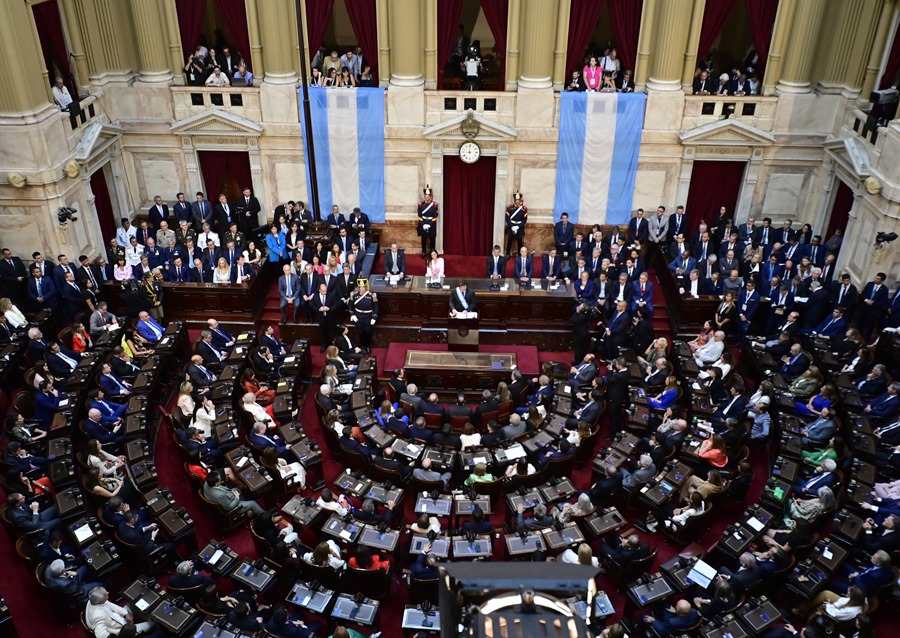
Argentine President Javier Milei has called on the opposition to sign the ‘May Pact’, a new foundational document with 10 State policies, while offering his “conviction” in response to criticisms over potential governance issues during his administration.
In his inaugural address at the ordinary sessions of the National Congress, the president urged the 23 provinces and the Autonomous City of Buenos Aires to sign this document on May 25, the Day of the Motherland, in the city of Córdoba (central Argentina).
However, he explained that he will summon local governors to the Casa Rosada (Government headquarters) “to sign a pre-agreement and enact both the Basic Law (and Starting Points for the Freedom of Argentines) and a package of fiscal relief for the provinces” to then work “on a common project” and “begin a new era of glory” for Argentina.
Milei aims for consensus
Behind this dual proposal lies the recent standoff between the president and provincial governors over fiscal adjustment and cuts in funds that the State must send to the territories, which led to a call for “dialogue” and “respect” from local governors amid Milei’s frequent outbursts and disparaging messages towards them.
“If what they seek is conflict, they will have conflict because, unlike some of you who think about your next election, we only think about freedom,” said the libertarian president.
Milei asked that, despite differences, leaders can “prioritize the nation’s interests over electoral ones”.
Therefore, he called on governors and leaders of political parties to sign the ‘May Pact’ to “leave behind the antinomies of the past”, with 10 State policies for Argentina to abandon “the path of failure”.
Inviolability of private property; non-negotiable fiscal balance; reduction of public spending to around 25% of Gross Domestic Product (GDP); tax reform to reduce tax pressure; review of the co-participation scheme (State-provinces) “and end the current extortionate model” were the first points listed.
Milei invites all parties
Furthermore, the commitment of the provinces to advance in the exploitation of natural resources; a “modern” labor reform; a sustainable pension reform; structural political reform to modify the current system; and opening up international trade for Argentina “to be a protagonist in the global market”.
Milei said that all parties are invited because, as he claimed, neither he nor his party want to “play the mediocre game of politics”, but rather they emerged on the scene to “seriously change the country”.
In response to the potential governance issues often discussed concerning the lack of “parliamentary strength” of La Libertad Avanza (LLA, far-right), Milei countered with his “conviction”.
Thus, he claimed that his party “may not have the parliamentary strength or governors or mayors, but it knows what it has to do, how to do it, and has the conviction to do it”.
LLA is the third parliamentary minority, with 38 deputies and 7 senators, and does not have any governors, which obliges it to make agreements to advance legislative projects.
Télam News Agency to be shut down
Milei announced that his government will close the Télam public news agency.
In reviewing some achievements of his Executive in the 82 days since taking office on December 10, the libertarian highlighted the closure of the National Institute against Discrimination, Xenophobia, and Racism (INADI), which he described as “thought police”, which, he explained, “spent 2.8 billion pesos to maintain paid militants”.
“In this same vein, we are going to close the Télam agency,” the president announced without offering further details of the operation.
He also referred to the “immorality” of “spending money to buy the will of journalists” through official advertising in the media, which his Executive has suspended for a year, “in a country where people are starving”.
Founded in April 1945, the Argentine public news agency Télam had been in the libertarians’ sights since the electoral campaign, during which several leaders referred to its possible privatization or closure, as well as with the rest of the public media.
However, today the president only mentioned Télam.
Other media may be affected
On February 5, the Argentine government published in the Official Gazette the decree of intervention for one year of all state media as part of its policy of “reorganizing public companies”.
The Educ.ar portal, Radio Nacional, Televisión Pública, the Télam news agency, and the segmented Public Content channels (Encuentro, Paka Paka, Depor TV, ACUA Mayor, and ACUA Federal) were included in the list of media intervened for a year – with the option of extension – by Decree 117/2024.
Also included were the administration of the Audiovisual Production Center and the assets of the Argentine Universal Audiovisual Content Bank (Bacua).
According to the decree, the mission of the intervention was to “develop a plan for reformulation, readjustment, and action for the societies”, which will include reviewing fund management, modifying the contracting regime, and appointing or suspending officials.
The document named Diego Chaher and Diego Marías as intervenor and deputy intervenor, respectively, of Radio and Television Argentina and, ‘ad honorem’, of Télam, Public Contents, and Educ.ar. Both under the authority of the Chief of Cabinet of Ministers, Nicolás Posse.
“Populism took away 90% of our income”
In addition, the Argentine president denounced that populism took away a good part of the population’s income, when reviewing the “inheritance” received from the Administration of the Peronist Alberto Fernández (2019-2023).
“Populism took away 90% of our income to the point that a third of formal workers are poor,” said the president at the beginning of his speech before the Legislative Assembly, which serves as the start of its ordinary sessions and which offers, as he himself recalled, 82 days after the start of his administration, last December 10th.
International
Two fans killed in gate collapse outside Chile’s Estadio Monumental

Two people lost their lives near the Estadio Monumental in Santiago, Chile, following a chaotic incident that occurred before the Copa Libertadores match between Colo Colo and Brazil’s Fortaleza on April 10. According to the Public Prosecutor’s Office, the victims were crushed after a fence on the stadium perimeter collapsed, though authorities are investigating whether a police armored vehicle may have played a role.
It was a black Thursday at Chile’s Estadio Monumental. Two local fans died outside the stadium after a yet-unclarified incident caused a metal gate to fall on them, leading to fatal asphyxiation.
Local media reports indicate that a group of fans attempted to force their way into the stadium before kickoff. In response, local police allegedly deployed armored vehicles to block the breach.
Preliminary reports cited by local newspapers and news agencies like EFE identify the victims as two young individuals—one 18 years old and the other just 13.
International
Dominican Republic mourns over 200 dead in Jet Set nightclub collapse
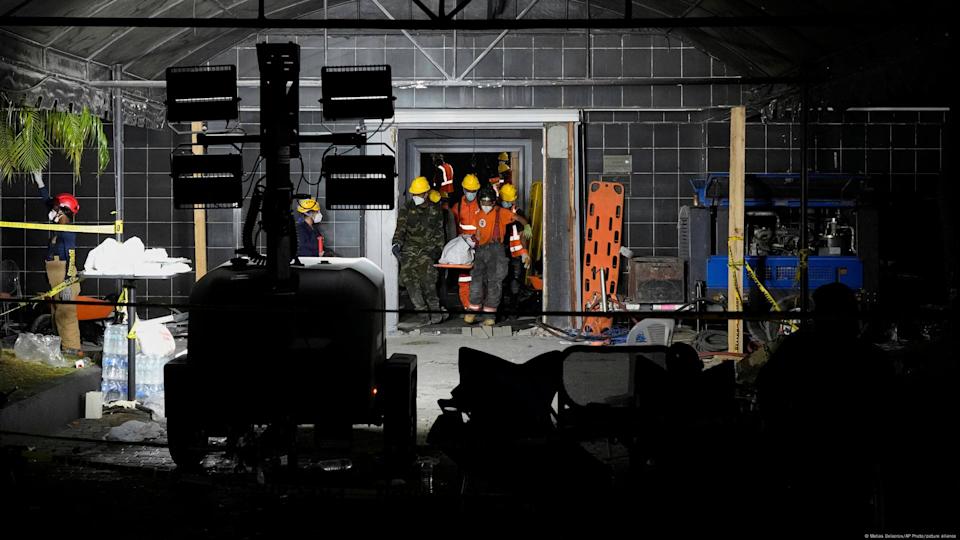
On Thursday, April 10, 2025, the Dominican Republic began mourning the more than 200 victims of the collapse of Jet Set nightclub in Santo Domingo, although many families are still desperately waiting for the remains of their loved ones.
The roof of the Jet Set club collapsed in the early hours of Tuesday, April 8, during a live performance by iconic merengue singer Rubby Pérez.
Rescue workers were completing the recovery of human remains from beneath the rubble of corrugated metal and steel beams, as search efforts ended with no further hope of finding survivors.
Around the morgue, the atmosphere was one of grief, anguish, and despair. A list of the deceased was posted on a canvas covering a nearby tent, where crowds gathered in distress. Health Minister Víctor Atallah stated that forensic teams are working at full capacity and urged patience. “No one will go unidentified, and no one will be left without answers,” he promised. “We will turn over every last stone if we have to.”
The tragic collapse also claimed the lives of several foreigners, including a significant number of Venezuelan nationals who were present at the club, according to local newspaper Listín Diario. The outlet reported the official death toll at 221, which included one Haitian, two French nationals, one Italian, and one Kenyan.
Meanwhile, relatives, friends, and fans of Rubby Pérez released white balloons outside the National Theater shortly before the hearse departed with the remains of the beloved singer, known for hits like “Enamorado de ella” and “Buscando tus besos.” Draped over his coffin were both the Dominican and Venezuelan flags, the latter symbolizing the country where his fame took off.
International
Venezuelan oil shipments resume after tariff-induced delays
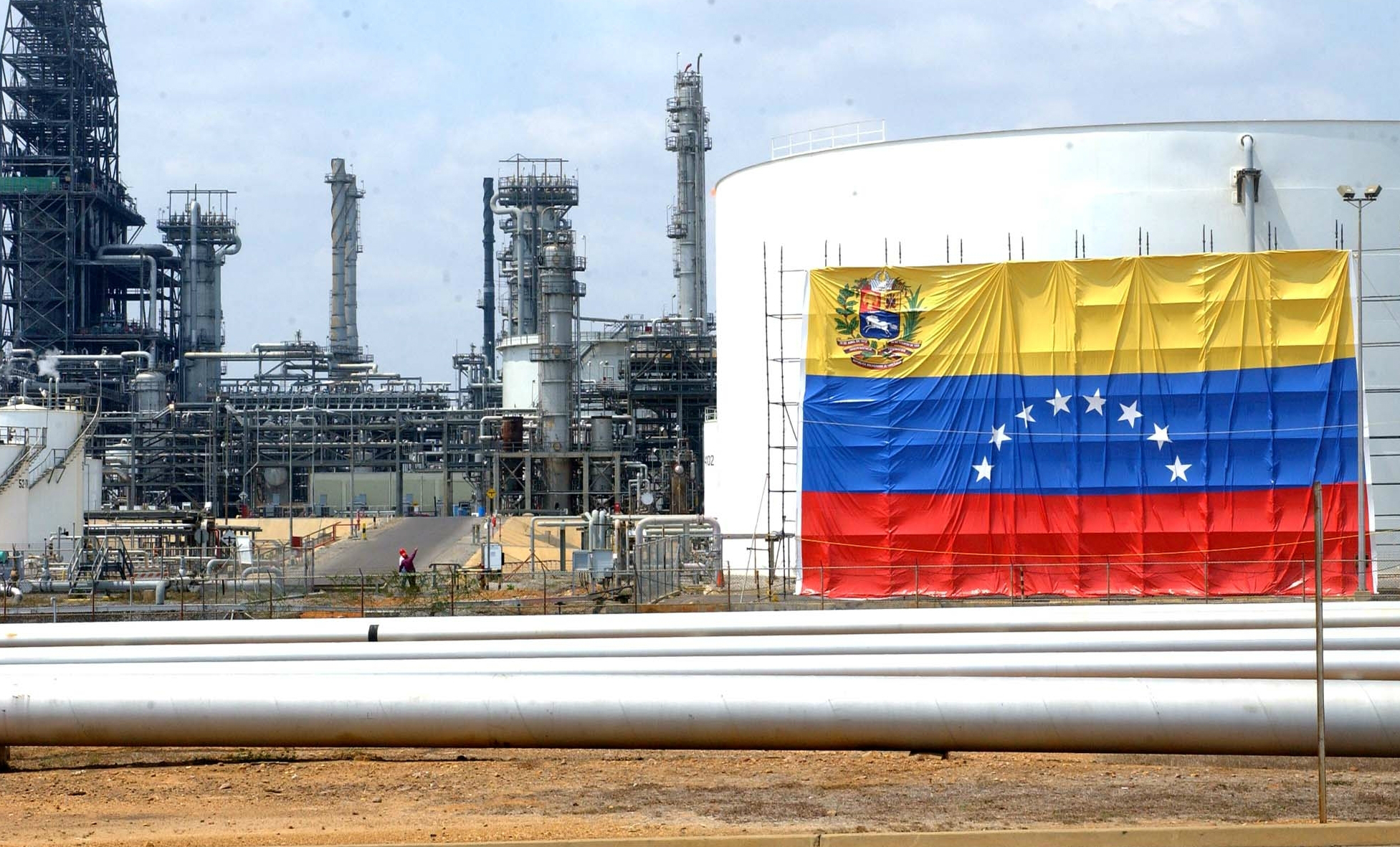
Many buyers of Venezuelan oil have resumed loading tankers after a week of pauses and delays at the country’s ports, caused by tariffs imposed by President Donald Trump on importers of crude from the OPEC member nation, according to shipping data and documents.
In March, the United States gave Chevron and other foreign partners and clients of Venezuela’s state oil company, PDVSA, until May 27 to gradually wind down operations and cease crude exports from the country. Days later, Washington imposed tariffs on buyers of Venezuelan oil and gas.
The measures triggered the suspension of some shipments at the country’s main oil port, Jose, and caused delays at smaller terminals. Many vessels that had left the Jose port and moved away from the coast amid the announcement of the measures have since returned to complete their loadings. In recent days, tankers have begun departing Venezuelan waters en route to destinations such as India and China, according to data and internal documents from PDVSA.
“There was a moment of panic when ships pulled away, but they later received instructions to finish loading,” said a source at PDVSA.
-

 Central America4 days ago
Central America4 days agoHonduras Hosts CELAC Summit Amid Regional Concern Over U.S. Deportations
-

 International11 hours ago
International11 hours agoDominican Republic mourns over 200 dead in Jet Set nightclub collapse
-

 Central America22 hours ago
Central America22 hours agoNicaragua seeks ICJ intervention in Gaza conflict amid escalating violations
-

 International3 days ago
International3 days agoRussia and US to Meet in Istanbul for Diplomatic Talks on April 10
-

 Central America3 days ago
Central America3 days agoAudit Exposes Major Breaches in Panama Canal Port Concession, $300 Million Owed to State
-
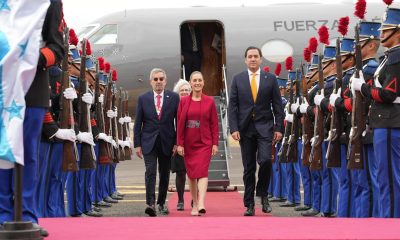
 Central America2 days ago
Central America2 days agoMexico’s president proposes regional economic summit at CELAC
-

 International4 days ago
International4 days agoTeachers in Southern Mexico Bring Education to Stranded Migrant Children
-

 Central America4 days ago
Central America4 days agoMulino and Orsi Highlight Shared Vision After Panama Joins Mercosur as Associate State
-
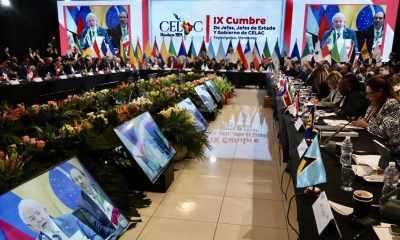
 Central America2 days ago
Central America2 days agoColombia to host fourth EU-CELAC Summit in November
-

 International2 days ago
International2 days agoMerengue concert turns to mourning as Jet Set collapse claims 136 lives
-

 Central America4 days ago
Central America4 days agoTrump Administration Asks Supreme Court to Block Return of Deported Salvadoran
-

 Sports3 days ago
Sports3 days agoNeymar Returns to Santos Training After Month-Long Injury Layoff
-
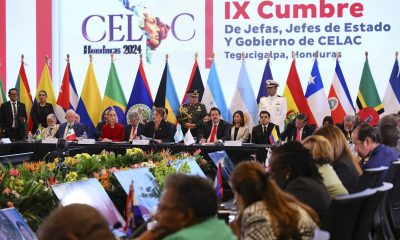
 Central America2 days ago
Central America2 days agoCELAC condemns unilateral sanctions in ‘Tegucigalpa Declaration’
-

 International3 days ago
International3 days agoMaduro Announces Economic Emergency Decree Amid Growing Tensions with the U.S.
-

 Central America23 hours ago
Central America23 hours agoU.S. Government says deported migrants should remain in El Salvador for life
-

 International3 days ago
International3 days agoTransgender Student Arrested at Florida Capitol for Using Women’s Restroom Under New State Law
-

 International23 hours ago
International23 hours agoItalian biologist found dead in Colombia; investigation underway
-

 International3 days ago
International3 days agoScience Brings Back the Extinct Direwolf with Successful De-Extinction Project
-

 International11 hours ago
International11 hours agoTwo fans killed in gate collapse outside Chile’s Estadio Monumental
-

 International23 hours ago
International23 hours agoMaduro signs Economic Emergency Decree to counter U.S. sanctions on Venezuela
-

 International11 hours ago
International11 hours agoVenezuelan oil shipments resume after tariff-induced delays
-
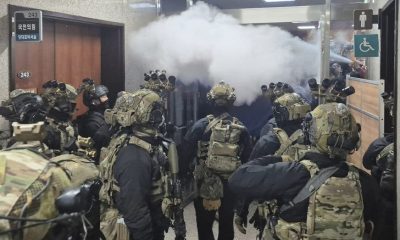
 International11 hours ago
International11 hours agoConstitutional Court Removes Yoon: Lee Jae-myung’s Rise Sparks Warnings of a Radical Shift















